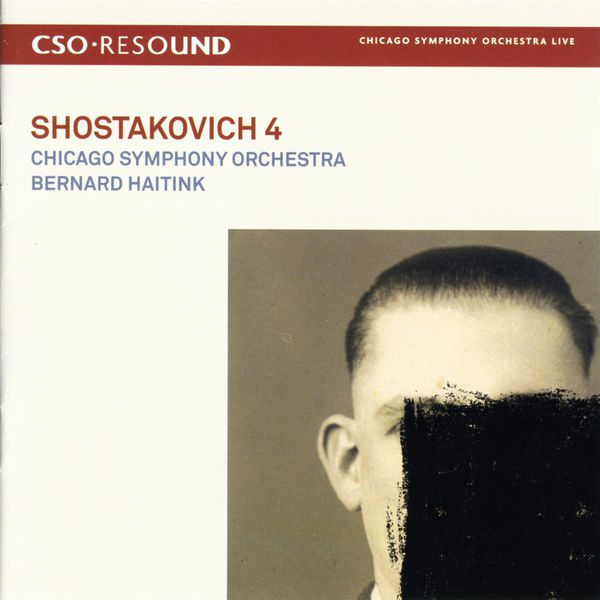
Musique illimitée
Écoutez cet album en haute-qualité dès maintenant dans nos applications
Démarrer ma période d'essai et lancer l'écoute de cet albumProfitez de cet album sur les apps Qobuz grâce à votre abonnement
SouscrireProfitez de cet album sur les apps Qobuz grâce à votre abonnement
Téléchargement digital
Téléchargez cet album dans la qualité de votre choix
Langue disponible : anglais
The last of Dmitry Shostakovich's youthful, experimental symphonies, the Symphony No. 4 (1935-1936) marked a critical turning point, for its modernist tendencies provoked a hostile article in Pravda, thought to have been written by Stalin himself to intimidate the composer. Because of this rebuke, the symphony was withdrawn from performance and not played again until 1961, so due to its comparatively late absorption in the repertoire, it is one of the least played of Shostakovich's symphonies. Yet this is one of his most gripping scores, full of volatile expressions and memorable ideas, and its expansive form, caustic themes, complex developments, and wide emotional range make it comparable in many ways to the symphonies of Gustav Mahler, on which it was partly modeled. Bernard Haitink and the Chicago Symphony Orchestra present this masterpiece in the CSO Resound line, and the results are breathtaking in this transparent audiophile recording. Haitink's long career of conducting Shostakovich puts him among the most authoritative interpreters, and he leads the orchestra with assurance through the work's mercurial moods and carefully guides it through treacherous technical difficulties, perhaps most impressively in the fugal flurries of the first movement's Presto section. The sound throughout is detailed, yet also spacious, so listeners have all the advantages of one without losing the other, and the crisp lines stand out all the more because of the depth of the reproduction. The symphony is paired with a bonus DVD, which features a documentary on Shostakovich, Is Music Dangerous?, with narrator Gerard McBurney and actor Nicholas Rudall, and excerpts from the CSO's performance of the Symphony No. 4.
© TiVo
Vous êtes actuellement en train d’écouter des extraits.
Écoutez plus de 100 millions de titres avec votre abonnement illimité.
Écoutez cette playlist et plus de 100 millions de titres avec votre abonnement illimité.
À partir de CHF 14,99/mois

Bernard Haitink, Conductor - Bernard Haitink, Conductor
Bernard Haitink, Conductor - Bernard Haitink, Conductor
Bernard Haitink, Conductor - Bernard Haitink, Conductor
Chronique
The last of Dmitry Shostakovich's youthful, experimental symphonies, the Symphony No. 4 (1935-1936) marked a critical turning point, for its modernist tendencies provoked a hostile article in Pravda, thought to have been written by Stalin himself to intimidate the composer. Because of this rebuke, the symphony was withdrawn from performance and not played again until 1961, so due to its comparatively late absorption in the repertoire, it is one of the least played of Shostakovich's symphonies. Yet this is one of his most gripping scores, full of volatile expressions and memorable ideas, and its expansive form, caustic themes, complex developments, and wide emotional range make it comparable in many ways to the symphonies of Gustav Mahler, on which it was partly modeled. Bernard Haitink and the Chicago Symphony Orchestra present this masterpiece in the CSO Resound line, and the results are breathtaking in this transparent audiophile recording. Haitink's long career of conducting Shostakovich puts him among the most authoritative interpreters, and he leads the orchestra with assurance through the work's mercurial moods and carefully guides it through treacherous technical difficulties, perhaps most impressively in the fugal flurries of the first movement's Presto section. The sound throughout is detailed, yet also spacious, so listeners have all the advantages of one without losing the other, and the crisp lines stand out all the more because of the depth of the reproduction. The symphony is paired with a bonus DVD, which features a documentary on Shostakovich, Is Music Dangerous?, with narrator Gerard McBurney and actor Nicholas Rudall, and excerpts from the CSO's performance of the Symphony No. 4.
© TiVo
À propos
- 1 disque(s) - 3 piste(s)
- Durée totale : 01:10:19
- 1 Livret Numérique
- Artiste principal : Bernard Haitink
- Compositeur : Dimitri Chostakovitch
- Label : CSO Resound
- Genre : Classique
 Pourquoi acheter sur Qobuz ?
Pourquoi acheter sur Qobuz ?
-
Streamez ou téléchargez votre musique
Achetez un album ou une piste à l’unité. Ou écoutez tout notre catalogue en illimité avec nos abonnements de streaming en haute qualité.
-
Zéro DRM
Les fichiers téléchargés vous appartiennent, sans aucune limite d’utilisation. Vous pouvez les télécharger autant de fois que vous souhaitez.
-
Choisissez le format qui vous convient
Vous disposez d’un large choix de formats pour télécharger vos achats (FLAC, ALAC, WAV, AIFF...) en fonction de vos besoins.
-
Écoutez vos achats dans nos applications
Téléchargez les applications Qobuz pour smartphones, tablettes et ordinateurs, et écoutez vos achats partout avec vous.



